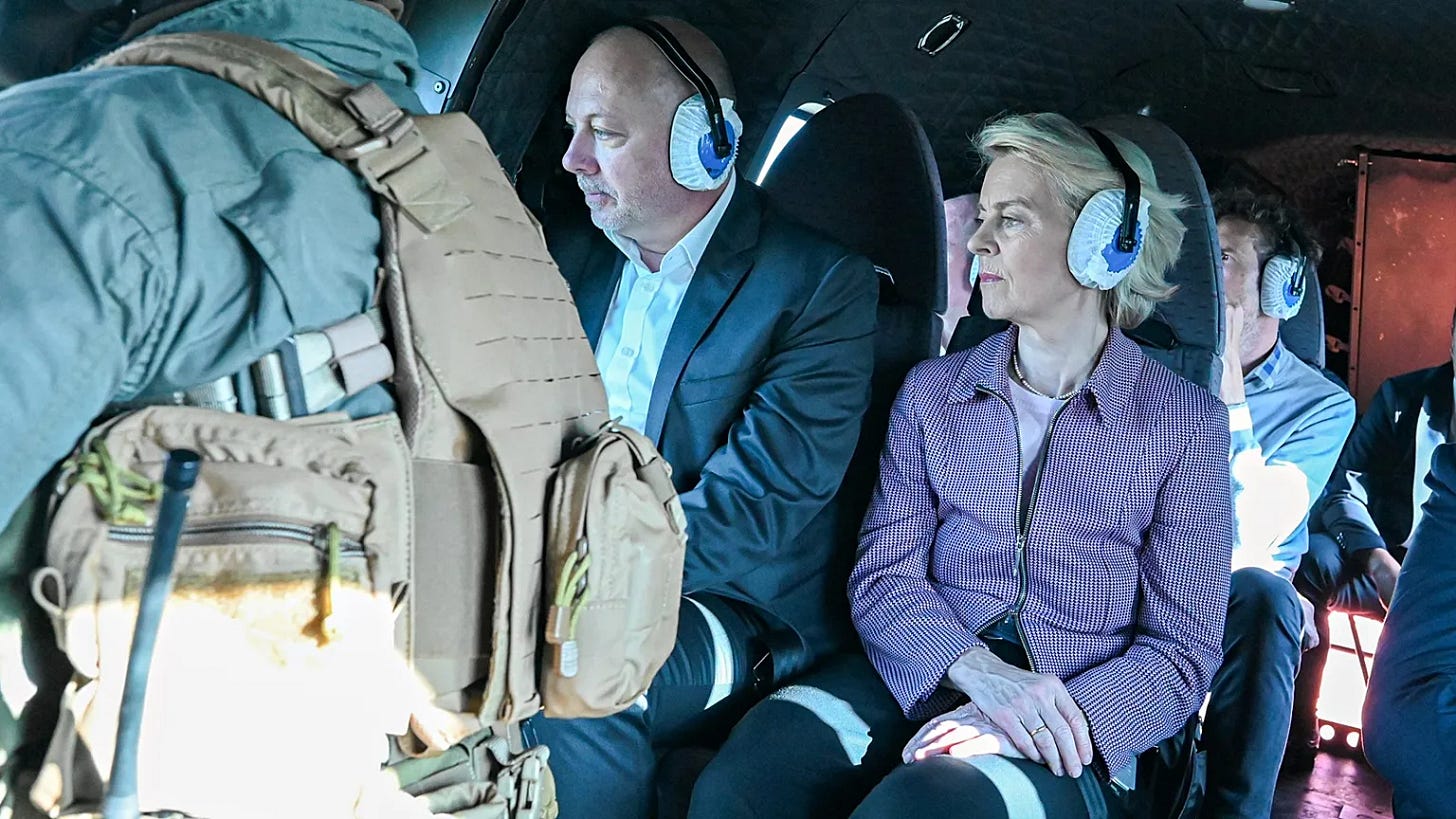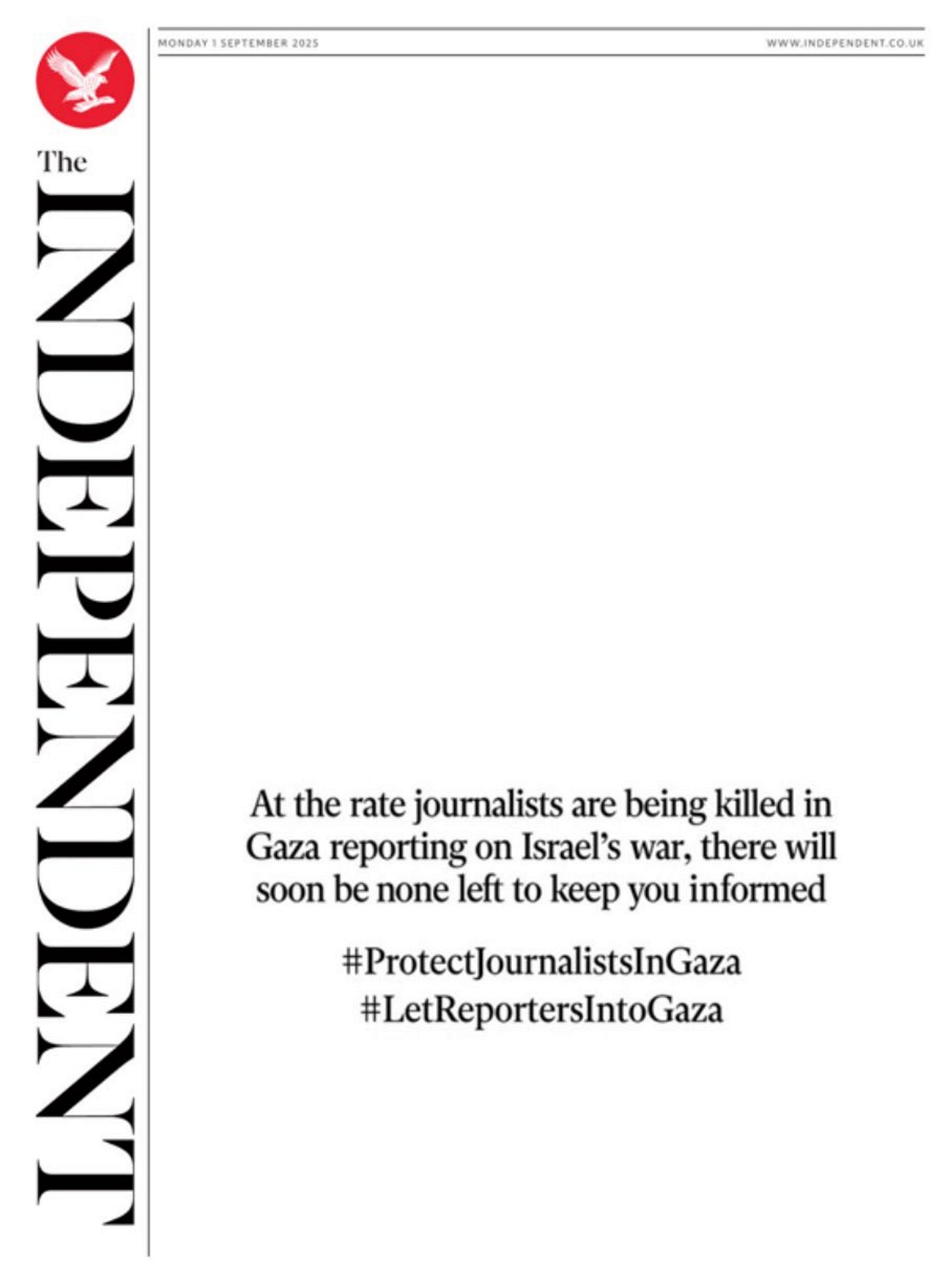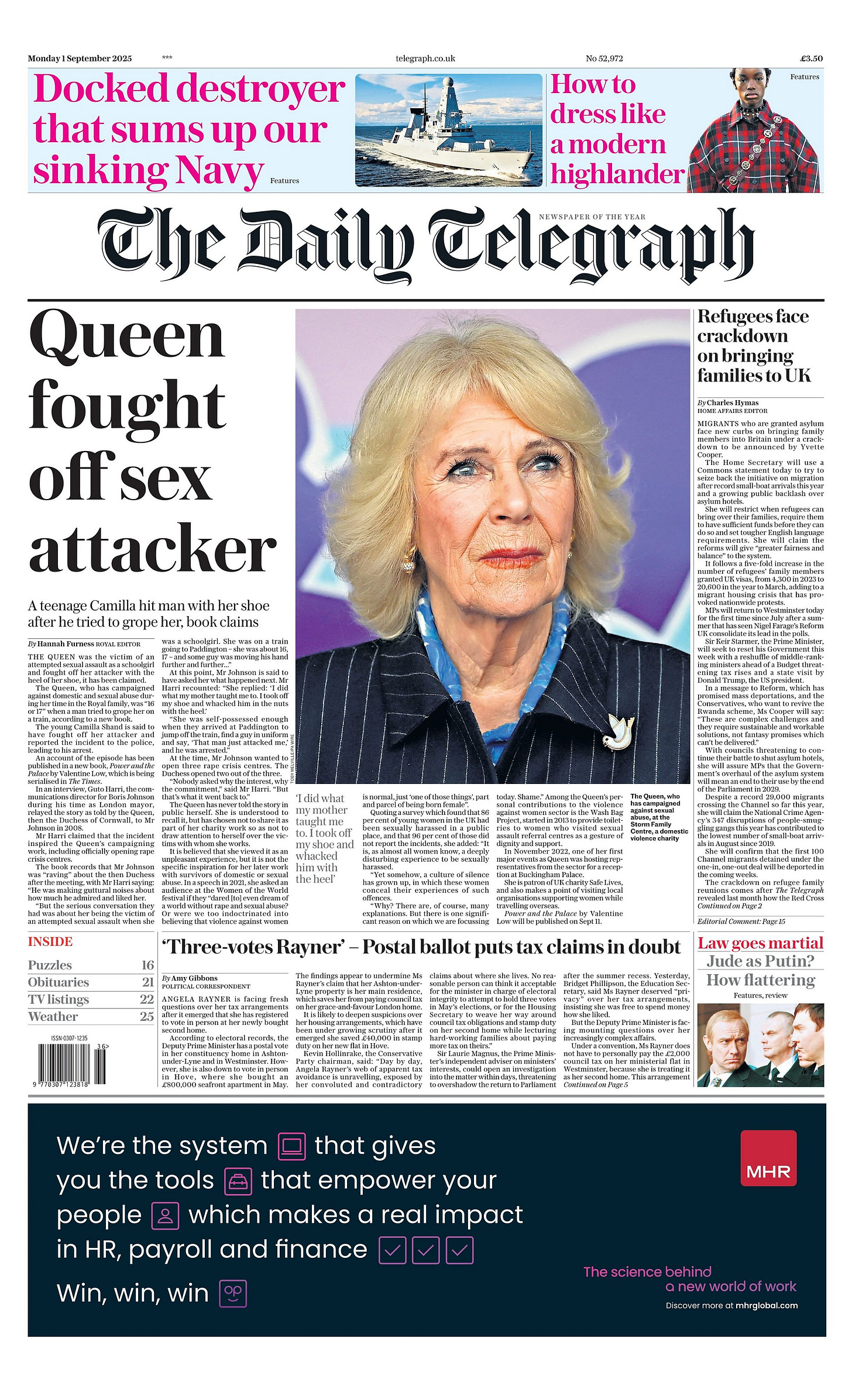GPS Jammed. Maps Out. Putin’s New Weapon in the Sky
When the EU chief's plane flew into suspected Russian interference over Bulgaria, it wasn’t just a close call — it was a stark reminder that Putin’s hybrid war is spilling deep into civilian skies

A suspected Russian interference attack targeting EU chief Ursula von der Leyen disabled GPS navigation services at a Bulgarian airport and forced the European Commission president’s plane to land using paper maps. A jet carrying von der Leyen to Plovdiv on Sunday afternoon was deprived of electronic navigational aids while on approach to the city’s airport, in what three officials briefed on the incident said was being treated as a Russian interference operation. “The whole airport area GPS went dark,” said one of the officials. After circling the airport for an hour, the plane’s pilot took the decision to land the plane manually using analogue maps, they added. “It was undeniable interference.” The Bulgarian Air Traffic Services Authority confirmed the incident in a statement to the Financial Times. “Since February 2022, there has been a notable increase in [GPS] jamming and recently spoofing occurrences,” it said. “These interferences disrupt the accurate reception of [GPS] signals, leading to various operational challenges for aircraft and ground systems.” Kremlin spokesperson Dmitry Peskov told the FT that “your information is incorrect”. The European Commission has been approached for comment. So-called GPS jamming and spoofing, which distorts or prevents access to the satellite-based navigation system, was traditionally deployed by military and intelligence services to defend sensitive sites, but has increasingly been used by countries such as Russia as a means of disrupting civilian life. EU governments have warned that rising GPS jamming blamed on Russia risks causing an air disaster by essentially blinding commercial aircraft mid-journey. GPS jamming incidents have risen significantly in the Baltic Sea and eastern European states close to Russia in recent years, affecting planes, boats and civilians who use the service for day-to-day navigation. Von der Leyen was flying from Warsaw to the central Bulgarian city to meet the country’s prime minister, Rosen Zhelyazkov, and tour an ammunition factory. She was on a tour of the EU’s frontline states to discuss efforts to improve the bloc’s defence readiness in response to Russia’s war against Ukraine. “[Russian president Vladimir] Putin has not changed, and he will not change,” von der Leyen told reporters while on the ground in Bulgaria on Sunday. “He is a predator. He can only be kept in check through strong deterrence.” - FT
Global Navigation Satellite System (GPS) interference, which comes in the forms of jamming, which means blocking the signal, and spoofing, which entails gaming location readouts, has become a daily occurrence in northeastern Europe. From the airport of Gdansk through the busy shipping lanes of the Baltic Sea and all the way to the airspace of Estonia and Finland, these interferences have been recorded almost daily since Russia’s full-scale invasion of Ukraine in February 2022. They have even resulted in flight cancellations, airport closures and commercial ships steering off track. Authorities in the Baltic states have laid the blame squarely on Russia. In March, eight European countries, including the Baltic states, Finland, Poland, France, the Netherlands and Ukraine, lodged a complaint with the UN about the practice. Several UN agencies have also taken up the issue, including the International Maritime Organization, the civil aviation authority ICAO and the International Telecommunications Union. For its part, Russia – itself a Baltic Sea country and with part of its territory heavily affected by the jamming – has maintained official radio silence on the topic. Open-source data and information released by governments in the Baltic states give some clues as to where these malicious signals might originate from. Two hotspots continuously pop up: Kaliningrad, Russia’s exclave wedged between Poland and Lithuania, and the St. Petersburg area. Both regions known to have a heavy Russian military presence, including divisions specialized in electronic warfare and radio - Defense News
Last year Estonia accused Russia of jamming GPS navigation devices in airspace above the Baltic states. Finnair had to divert two flights back to Helsinki after GPS interference prevented their approach to Tartu in eastern Estonia - Reuters
Watch my live interview on CNN, where I send a message of warning to EU leaders about the consequences of delaying harsh action against Russian President Vladimir Putin….
Debris from a crashed Ukrainian drone sparked a forest fire roughly 10 kilometers (six miles) from Russian President Vladimir Putin’s seaside mansion on the Black Sea coast, officials said. The fire broke out between the village of Krinitsa and Gelendzhik, the closest town to the residence known as “Putin’s palace.” It initially covered 3,000 square meters (32,000 square feet) before spreading to 7,000 square meters (75,000 square feet), and the Emergency Ministry later reported it had grown to 32,000 square meters (340,000 square feet). The wildfire trapped 23 people near the coastline, the ministry said, and a rescue boat was dispatched to evacuate them. According to Gelendzhik Mayor Alexey Bogodistov, a vacation resort had to be evacuated. Ukrainian drone attacks have had a major impact on the Russian president’s travel habits. He’s largely stopped traveling to Sochi, which was previously one of his most frequent destinations. A source who knows Putin personally told journalists from Proekt that this is due to his fears for his safety - Meduza
In Russia’s Belgorod region, which shares a border with Ukraine, many buildings have been covered in nets to protect them from Ukrainian drones, Meduza reported. While anti-drone netting was first installed on buildings (and ambulances) in areas along the border, Governor Vyacheslav Gladkov announced in late August that the regional capital and the surrounding district would install nets over local kindergartens too. According to the governor, local authorities purchased 500,000 square meters of protective netting — an area equivalent to roughly 70 soccer fields — and planned to cover 56 buildings ahead of the new school year, which begins on September 1. However, he also noted that in border areas, some protective nets covering residential buildings and public infrastructure are already in need of repairs or replacement.
Russian President Vladimir Putin says he reached "understandings" with US President Donald Trump over the end of the Ukraine war at their meeting in Alaska last month. But he did not say whether he would agree to peace talks with Ukrainian President Volodymyr Zelensky brokered by Trump, who had apparently given Monday as a deadline for Putin's response. Speaking during a summit in China, Putin continued to defend his decision to invade Ukraine, once again blaming the West for the war. Following the Alaska meeting, US special envoy Steve Witkoff said Putin had agreed to security guarantees for Ukraine as part of a potential future peace deal, though Moscow has yet to confirm this.
Putin was speaking in Tianjin at the Shanghai Co-operation Organisation summit, where he met Xi Jinping and Narendra Modi. He thanked the Chinese and Indian leaders for their support and their efforts to "facilitate the resolution of the Ukrainian crisis". China and India are the biggest buyers of Russian crude oil, attracting criticism from the West that they are propping up the Russian economy which has been battered by the war effort. In his speech, Putin also said that the "understandings reached" at his meeting with Trump in Alaska were "I hope, moving in this direction, opening the way to peace in Ukraine". At the same time, he reiterated his view that "this crisis wasn't triggered by Russia's attack on Ukraine, but was a result of a coup in Ukraine, which was supported and provoked by the West". He also attributed the war to "the West's constant attempts to drag Ukraine into Nato" - BBC
Zelensky has promised new strikes in the Russian interior a day after Moscow carried out a fresh wave of bombardments in southeastern Ukraine, as the war showed no signs of slowing despite U.S. efforts. Mr. Zelensky on Sunday shared a report from Gen. Oleksandr Syrskyi saying Ukrainian forces had managed to “methodically destroy the occupier” in the Donetsk region, where most of the intense fighting is concentrated. The Ukrainian president said Russians had sustained 290,000 casualties through the first eight months of the year in the battle-ravaged eastern section of the country. Ukraine pulled off multiple strikes this summer that damaged dozens of valuable fighter jets and strategic bombers at Russian airfields far from the battlefield - Washington Times
More than 600 people have died after a magnitude 6.0 earthquake hits eastern Afghanistan, the Taliban interior ministry reports. The quake struck at a shallow depth of 8km (5 miles) - which can be more destructive - and shook buildings from Kabul to Pakistan's capital Islamabad - here's what we know so far
The remote areas make assessing the damage hard - helicopters are trying to rescue people from difficult to access regions. Masses are feared trapped under the rubble, while officials report entire villages being destroyed. Eyewitnesses say entire villages have been flattened and reduced to rubble - BBC
For the first time in recent history, newsrooms across the world have coordinated a large-scale editorial protest in solidarity with journalists in Gaza. More than 250 news outlets from over 70 countries will simultaneously black out their front pages and website homepages, and interrupt their broadcasting to condemn the murder of journalists by the Israeli army in the Gaza Strip. Together, these newsrooms demand an end to impunity for Israeli crimes against Gaza’s reporters, the emergency evacuation of reporters seeking to leave the Strip and that foreign press be granted independent access to the territory. Online media outlets will black out their homepages or publish a banner as a sign of solidarity. Individual journalists have also joined the campaign and will post messages on their social media accounts. This operation comes as 220 journalists have been killed by the Israeli army in the Gaza Strip in less than 23 months, according to RSF data. On the night of 10 August alone, the Israeli army killed six journalists in a targeted strike against Al-Jazeera correspondent Anas al-Sharif. Fifteen days later, on 25 August, the Israeli army killed five journalists in two consecutive strikes. In parallel to these killings, the Israeli army has barred foreign journalists from entering the Strip for nearly two years, leaving Palestinian journalists to cover the war while under fire.
“At the rate journalists are being killed in Gaza by the Israeli army, there will soon be no one left to keep you informed. This isn’t just a war against Gaza, it’s a war against journalism. Journalists are being targeted, killed and defamed. Without them, who will alert us to the famine? Who will expose war crimes? Who will show us the genocides? - Thibaut Bruttin, Général Director RSF
White House trade adviser Peter Navarro warned that if the US Supreme Court overturns the global tariffs introduced under President Donald Trump, it would mark the collapse of the United States. He commented on a federal appeals court ruling that upheld a lower court’s decision declaring the tariffs unlawful under the International Emergency Economic Powers Act (IEEPA). Navarro stressed that eliminating the tariffs would erase a major source of federal revenue, about $31 billion in August alone, over 8% of Treasury cash inflows. Analysts estimate the decision could cut tariff revenues by $2 trillion by 2034, reducing their budget impact by 71%. Navarro argued the tariffs were needed to counter “emergencies” such as the fentanyl crisis and the trade deficit, and could be lifted if those threats disappear. President Trump has already hinted at appealing to the Supreme Court, while his administration is mounting pressure to stress that the future of US trade policy is at stake.
Separately, Navarro called India “nothing but a laundromat for the Kremlin” and alleged that “Brahmins are profiteering at the expense of the Indian people”, while arguing in favour of the tariff imposition. He asked why the world’s “biggest democracy” was doing business with Russian President Vladimir Putin and Chinese President Xi Jinping, in his criticism of India buying Russian crude oil. This is not the first time that Navarro has attacked India over its purchase of Russian oil. He recently defended the US tariffs on India which doubled with an additional 25 per cent giving the same argument. He also pointed out that India’s purchase of Russian oil was not significant before the Ukraine invasion in February 2022. “What happened? Well, the Russian refiners went in and got into bed with big oil India. Putin gives (Prime Minister Narendra) Modi a discount on the crude. They refine it and they ship it to Europe, Africa and Asia at a big premium and they make a ton of money,” he said. American national security expert Derek J Grossman did not concur with Navarro’s remarks and said, "Fomenting caste unrest in India should never be US foreign policy.”
DeepSeek, one of China’s leading artificial intelligence developers, has decided to use Huawei Technologies’ AI chips to train some of its AI models, a sign it is reducing its reliance on Nvidia chips, according to three people with knowledge of the effort. The move follows pressure by the Chinese government on local tech companies to use locally made chips more. DeepSeek continues to use Nvidia chips for its largest and most powerful AI models. Even so, the decision to use Huawei chips for training smaller models signals a turning point in the use of U.S. technology by Chinese AI companies. - The Information
A decision in mid-July 2025 by the global bank HSBC to disband its internal geopolitical advisory group caught observers by surprise. The decision was especially perplexing given HSBC’s anomalous position between China and the West, which leaves the bank uniquely exposed to such risks. Geopolitical risks have radically worsened in recent years, and firms need to adjust quickly to a deeply uncertain world - Steve Vickers
Bali is losing about 1,000 hectares of rice fields annually, as tourists-driven development wipes out a quarter of its agricultural land over the last 25 years. This isn’t just a visual loss—the UNESCO‑listed subak irrigation system, centuries of farming rituals, and sacred village spaces are disappearing too. Groundwater is drying up (tourism now uses ~65% of Bali’s freshwater), threatening both farmers and their culture. Tourists account for 60-70% of Bali’s regional GDP, according to 2019 estimates—an outsized share compared to the national tourism sector, which represents about 5% of Indonesia’s GDP. Bali saw 6.33 million international visitors last year—surpassing its pre-pandemic peak of 6.28 million in 2019 and representing nearly half of the country’s total 2024 visitors. Last summer, Barcelona residents made headlines for squirting water at visitors in protest of their city being overrun. Indonesia’s then-tourism minister, Sandiaga Uno, warned in September that if Bali saw a 10% increase in tourists, it could soon see the same kind of local frustration boil over, Time magazine reported. “We must avoid a situation like Barcelona, where tourists became public enemies," he said. But that 10% threshold was more than met by 2024’s foreign visitor record—a 20% increase from 2023. But Bali, the only Hindu enclave in Indonesia of 4.4 million people, still wants more. Development costs may bring quick money, but at the cost of Bali’s soul.




